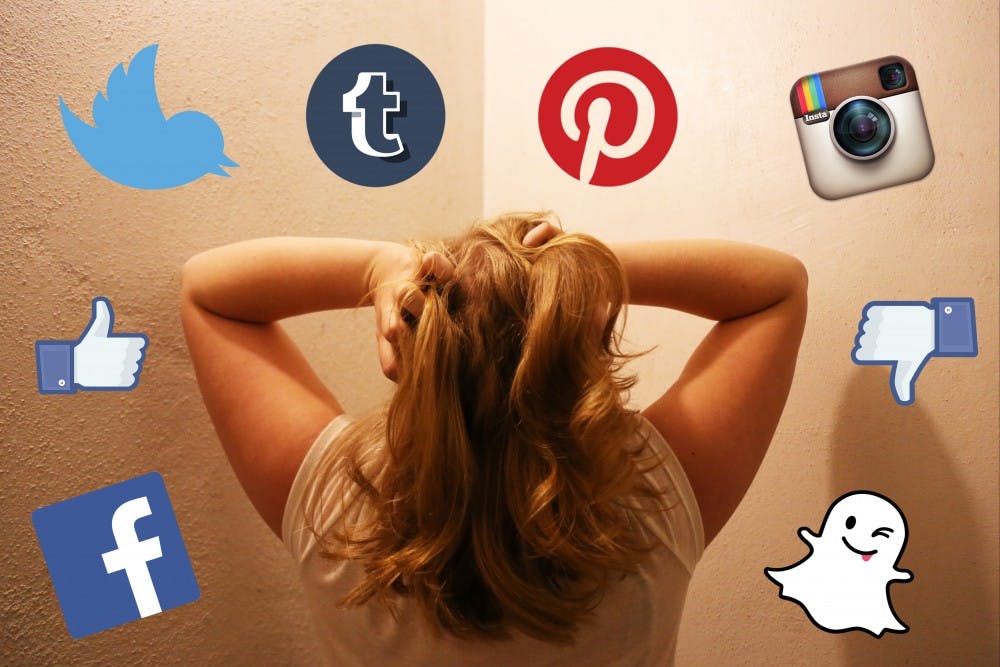We all browse social media from time to time. Some of us browse incessantly, scrolling through Instagram, Twitter and Snapchat every half hour while some of us browse it once or twice a day. Additionally, some of us browse it more extensively than others, delving into the dangerous territory of social media “stalking.”
There is nothing wrong with this. People post on social media with the sole intention of having others view their profiles, but these relationships and facades built upon these social media sites are enough to make one go insane. Let me explain.
Although most cases are mild and wouldn’t usually be considered examples of psychotic behavior, our actions on social media may be linked to psychological conditions, more so than we think. For example, Dr. Uri Nitzan of Tel Aviv University’s Sackler Faculty of Medicine and the Shalvata Mental Health Care Center conducted a study with Facebook users, examining “vulnerable” patients suffering from the loss of a loved one (typically due to a breakup). What he found was astonishing. According to Social News Daily, his studies suggest that “a connection was found between the gradual development and exacerbation of psychotic symptoms, including delusions, anxiety, confusion and intensified use of computer communications.” In other words, the innocent Facebook stalking you are partaking in is classified as a form of psychotic behavior.
Look for yourself. Type “Facebook psychosis” into Google and feast your eyes. You will see endless narratives of individuals who experienced this mental condition first-hand with the scientific credibility to back it up.
The sad thing is that this behavior pervades all aspects of our lives, and it’s not just Facebook psychosis. Our mental health is compromised at the hands of social media.
Social media sites are addictive. Studies show that 63 percent of Facebook users check their account daily while 40 percent check their account multiple times a day. The fact that the Berge Facebook Addiction Scale was made to measure users’ addiction should be enough to pose a problem.
Though research has been conducted suggesting that social media aids individuals, providing introverts with a means to communicate, we must look at the nature of the relationship between humans and social media sites. According to the American Medical Psychological Association, introverts can gain social skills through the use of social media. This may be the case, but these social skills don't provide a substantial substitute for social interaction.
Many a time, I walk past a fellow ASU student who has liked or commented on over 20 of my Instagram photos, yet won’t acknowledge me when I say hello to them. It may seem petty to assume that these people have an obligation to be my friend due to their activity on my account, but that's not my point. Rather, I am pointing to the idea that these relationships we foster on social media sites have an air of superficiality.
After all, we use social media to portray ourselves in a a specific way. In reality, a person may be drastically different from the character he or she takes on in order to fit the social norm associated with social media.
Not to sound like I prefer the old days, but I would much rather sit down with a person and speak to him or her one-on-one, despite the inconvenience we find in this form of communication nowadays. This way, I can measure a person’s character holistically, rather than seeing him or her for the memes they post on social media or their carefully planned responses when I privately message them. Social media leaves us with a feeling of detachment; the relationships we establish through this medium of communication seem to lack genuineness.
According to Huffpost College, Dr. Anne Marie Albano, director of the Columbia University Clinic For Anxiety and Related Disorders, said, “Social media and other technologies can give an individual a false sense of having true relationships, which can get in the way of developing peer support and mentor relationships. In actuality, they never cross over to make an engaging relationship with such people in the real world.”
So the next time you use social media, whether it involves lurking on someone’s account or posting selfies in hopes of receiving positive comments, consider that you might not be better off socially. In fact, you may be compromising your mental health.
Related links:
Why we should stop ‘creeping’ on social media
Ironically, this article will be posted on multiple forms of social media. Check me out on Facebook or Twitter at @ghirneise2 .
Editor’s note: The opinions presented in this column are the author’s and do not imply any endorsement from The State Press or its editors.
Want to join the conversation? Send an email to opiniondesk.statepress@gmail.com. Keep letters under 300 words and be sure to include your university affiliation. Anonymity will not be granted.
Like The State Press on Facebook and follow @statepress on Twitter.




